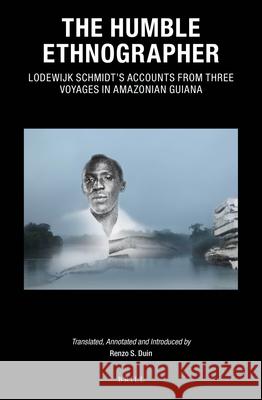The Humble Ethnographer: Lodewijk Schmidt's Accounts from Three Voyages in Amazonian Guiana » książka
The Humble Ethnographer: Lodewijk Schmidt's Accounts from Three Voyages in Amazonian Guiana
ISBN-13: 9789004429710 / Angielski / Twarda / 2020 / 206 str.
Thanks to Renzo Duin's annotated translation, the voice of Lodewijk Schmidt—an Afrodiasporic Saramaka Maroon from Suriname—is finally available for Anglophone audiences worldwide. More than anything else, Schmidt's journals constitute meticulous ethnographic accounts telling the tragic story of the Indigenous Peoples of the Eastern Guiana Highlands (northern Brazil and southern French Guiana and Suriname). Schmidt's is a story that takes account of the pathological mechanisms of colonialism in which Indigenous Peoples and African Diaspora communities—both victims of colonialism—vilify each other, falling privy to the divide-and-conquer mentality mechanisms of colonialism. Moreover, silenced in the original 1942 publication, Schmidt was sent on a covert mission to determine if the Nazis had established bases and airfields at the southern border of Suriname. Schmidt described the precariousness of the Amazonian forest and the Indigenous Peoples and African Diasporic people who lived and continue to live there, drawing on language that foreshadows our current anthropic and ecological concerns. Duin's profound knowledge of the history, geography, and ecology of the region contextualizes Schmidt's accounts in a new introduction and in his analysis and afterthought forces us to take account of the catastrophe that is deforestation and ethnocide of the Indigenous Peoples of Amazonian Guiana. Lodewijk J. Schmidt (1898-1992) Saramaka from Gansee (modern Saamaka spelling: Ganzë; pronounced Ganzè), upper Suriname river, Suriname, South America. The Saramaka are one of the largest African Diaspora communities in Suriname. He was educated by the Herrnhutters in the school of the Moravian Church, and during the mid-twentieth century he took part in several momentous expeditions, such as the 1935-38 Border Expedition between Suriname and Brazil. The present work is the annotated translation of his accounts of a tri-partite expedition conducted between 1940 and 1942 at and across the southern border of Suriname. Renzo S. Duin (1974) obtained a PhD in Anthropology from the University of Florida (USA). Between 1996 and 2019 he conducted over 40 months of fieldwork in the Guianas (Suriname, French Guiana, and Guyana). His research and publications cover a broad range of topics: socio-political landscape studies; material culture; intangible heritage; social memory; oral history; identity; ethno-astronomy; historical ecology; decolonization; and the intertwining nature of these topics, and as such offers an alternative to the twentieth century model of tropical forest cultures in Amazonia.











